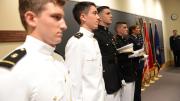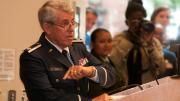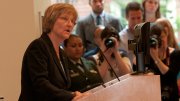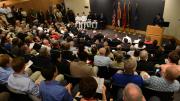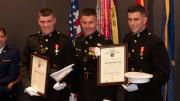Heavy early-morning rain and threatening skies forced this year’s Reserve Officers’ Training Corps ceremony indoors, but couldn’t squelch the pride and enthusiasm of the families, friends, and alumni who turned out to honor the Harvard seniors receiving their commissions Wednesday morning in Boylston Hall’s Fong Auditorium.
- Joining the U.S. Navy is Ensign Colin Dickinson, of Dunster House and Garden City, New York, an economics concentrator with a minor in organismic and evolutionary biology. Midshipman Christian Yoo, of Currier House and Bronxville, New York, a physics concentrator, is also headed to the navy, but will commission at a later date.
- Joining the U.S. Air Force is Second Lieutenant Courtney Diekema, of Eliot House and Holland, Michigan, who concentrated in comparative government.
- Joining the U.S. Marine Corps are Second Lieutenants Brian Furey, of Eliot House and Portland, Maine, an economics concentrator, and Gavin Pascarella, of Dunster House and Corona, California, a government concentrator with a focus on international relations.
Two guest speakers also honored the rite of passage. Representing this year’s fiftieth-reunion class, Lieutenant Colonel David R. Downer ’63, now retired from the U.S. Air Force, gave the soon-to-be officers a quick tour of his own military tours of duty, providing the gift of practical advice on seizing opportunities to do well at their posts and enlarge their experience. Decisions have consequences affecting those who make them and others besides, he noted. A civil engineer who was instrumental in activating the first operational wing of F-15 fighter aircraft, he told the five seniors, “You must always accept greater responsibility when it comes your way, whether you feel up to the challenge or not.…The services, in a broad sense, don’t promote people, they promote folders full of records and a photograph,” he added, so “do what you can to enhance the contents of that folder.” Whether opting for a military career or returning to civilian life, he concluded, “You’ll have decisions to make and you’ll make mistakes. We all do. So look for challenges, take them on, and have a great time.”
President Drew Faust, herself a veteran’s daughter, used her remarks to illustrate why she worked so hard, early in her tenure, to help restore ROTC to Harvard. She began by mentioning more than a dozen men and women among the more than 300 current Harvard students who are still serving in, or have recently left, the armed services, such as the air force pilot, a veteran of Iraq, now training to become a physician, and the current senior who enrolled at the College after four years of active duty and is heading off after graduation to join Teach for America.
But she focused primarily on her growing concern that too many Americans do not fully understand what Americans are asking of their military, which includes less than 1 percent of the population. She quoted Admiral Michael Mullen, former Chairman of the Joint Chiefs of Staff, speaking at West Point, who said the military’s work was appreciated, but added that he feared that people “do not know us” and the burden service members endure. Americans, Faust said, “must take responsibility for our interconnectedness” and honor those on active duty and veterans better. Tens of thousands of the latter, including many women, are homeless, she noted, and still suffer from physical or psychic wounds. Our thanks cannot be limited to “a phrase that falls from our lips” when we encounter a member of that 1 percent, she asserted. “We must commit ourselves to taking responsibility for the burden our veterans have carried” and seek to understand what we are asking the military to endure. “That,” she said, “is the true way to thank them for their service and the very best way for us to honor” the service yet to come from the newly commissioned officers from Harvard.
